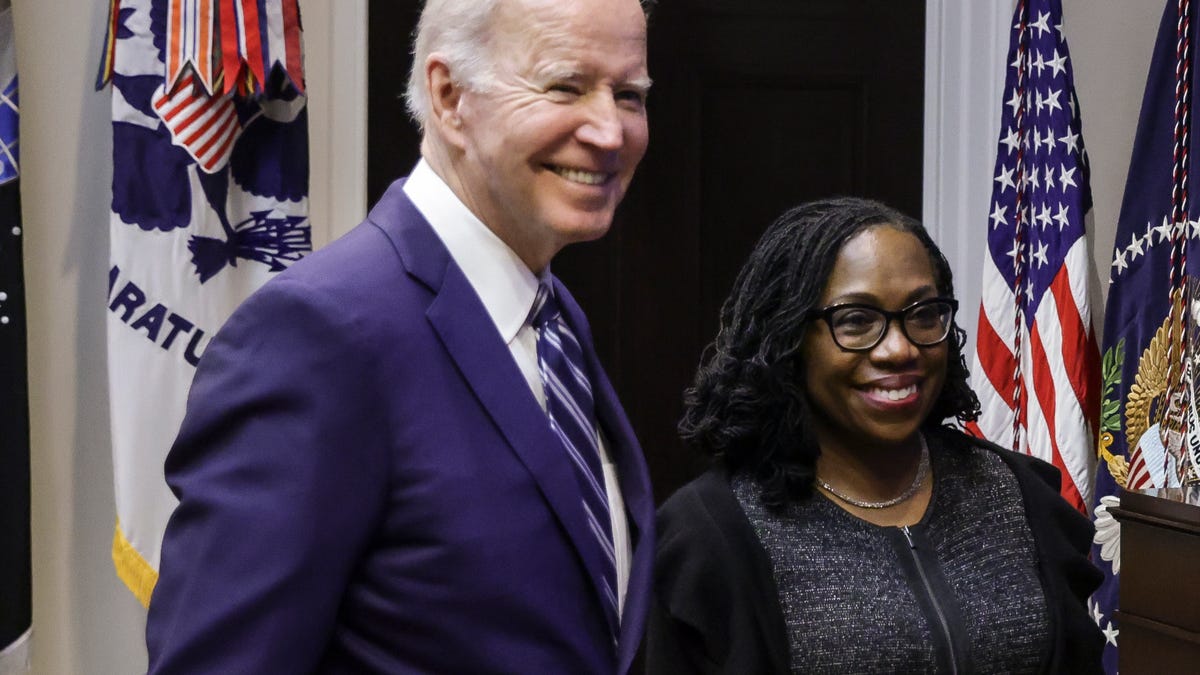How to Watch Ketanji Brown Jackson Be Sworn In as a Supreme Court Justice
Judge Jackson will take her oaths of office on Thursday after the court issues its final opinions of the current session.

President Biden nominated Ketanji Brown Jackson in February to be the first Black woman on the Supreme Court.
Judge Ketanji Brown Jackson will be sworn in as the first Black woman on the Supreme Court today at noon ET (9 a.m. PT).
She was confirmed by the Senate in April to replace retiring Associate Justice Stephen Breyer, who formally steps down today following the release of the Supreme Court's final opinions for this session at 10:30 a.m. ET (7:30 a.m. PT).
Read on to find out how to watch the swearing-in ceremony and learn what Jackson will likely hear as the newest member of the Supreme Court.
Where can I watch Ketanji Brown Jackson be sworn in?
Judge Jackson's swearing-in as the 104th associate justice on the US Supreme Court will be livestreamed on the Supreme Court website beginning approximately at noon ET (9 a.m. PT), following the release of the remaining opinions on the court's current docket, which is slated for 10:30 a.m. ET.
Jackson will take two oaths: the Constitutional Oath, in which she affirms that she's bound to support the Constitution and that "no religious test shall ever be required as a qualification to any office," and the Judicial Oath, in which she vows to administer justice impartially and faithfully, "without respect to persons, and do equal right to the poor and to the rich."
Chief Justice John Roberts will administer the constitutional oath, while outgoing Associate Justice Stephen Breyer will administer the judicial oath. A formal investiture ceremony will take place at a date to be determined later.
US Supreme Court nominee Judge Ketanji Brown Jackson was sworn in before her Senate Judiciary confirmation hearing on March 21, 2022.
What cases could Jackson hear on the Supreme Court?
The start of the new judicial term is traditionally the first Monday in October. This year that falls on Monday, Oct. 3.
To date, the Supreme Court has agreed to review at least 20 cases during its 2022-2023 term, though it has not scheduled any of them for arguments. They include:
- An appeal challenging the constitutionality of the Federal Trade Commission, which is charged with enforcement of antitrust laws and promoting consumer protection.
- Merrill v. Milligan, a gerrymandering case that looks at whether Alabama is obligated to create a second Black-majority congressional district under the Voting Rights Act of 1965.
- Andy Warhol Foundation for the Visual Arts v. Goldsmith, which questions whether the late pop artist's use of Lynn Goldsmith's photograph of Prince constitutes fair use or copyright infringement.
- Sackett v. Environmental Protection Agency, which concerns how the EPA interprets the Clean Water Act to determine what land falls within its jurisdiction.
- A legal challenge by Lorie Smith, a Colorado web designer who refuses to make sites for same-sex weddings and claims the state's public-accommodation law violates her freedom of religion and right to free speech.
- National Pork Producers Council v. Ross, which examines whether California excessively burdened interstate commerce with a 2018 voter-backed amendment that meat sold in the state follow new animal-cruelty regulations.
One case Jackson won't hear is a suit challenging affirmative action practices at Harvard University, where she earned both her undergraduate and law degrees and serves on the Board of Overseers. She testified in her hearings that she would recuse herself from the case.
Who is Ketanji Brown Jackson?
Jackson was born in Washington, DC, in 1970 and raised in Miami. Her father, Johnny, was an attorney for the Miami-Dade School Board while her mother, Ellery, was principal at New World School of the Arts in downtown Miami.
Jackson's maternal uncle, Calvin Ross, was Miami's police chief from 1991 to 1994. Her younger brother, Ketajh Brown, served with the Baltimore Police Department from 2001 to 2008.
Jackson in Sen. Cory Booker's Capitol Hill office.
After receiving both her degrees from Harvard, Jackson worked as a public defender and in private practice. She also served as a US district judge in the District of Columbia and on the US Sentencing Commission.
She was nominated to the court by President Joe Biden on Feb. 25, after Breyer announced he was retiring at the end of the current judicial session.
Announcing her nomination, Biden said she was "one of our nation's brightest legal minds and will be an exceptional justice." He praised her as a "proven consensus builder" with a distinguished resume as both an attorney and a jurist.
At the same briefing, Jackson credited her father with inspiring her passion for the law. "Some of my earliest memories are of him sitting at the kitchen table reading his books," she said. "I watched him study, and he became my first professional role model."
The Senate approved her nomination on April 7 by a 53-47 vote, largely along party lines. The Constitution provides that justices serve during "good behavior," which has generally been interpreted as a lifetime appointment.

